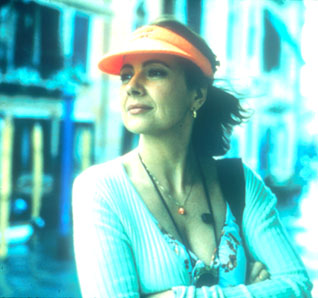![[Metroactive Movies]](/gifs/movies468.gif)
[ Movies Index | Show Times | North Bay | Metroactive Central | Archives ]
Canal Zone
Trip to Venice leads to old-fashioned romance
By Richard von Busack
THE DIFFERENCE between charm and irritation is like the difference between a person who quotes a few brief lines of Italian poetry and one who sits down and reads Ariosto's Orlando Furioso in its entirity. The Italian import Bread and Tulips is, on the whole, loaded with charm. Wherever this film is playing, no one over 40 can complain there's nothing to see at the movies.
And yet, it's also plainly too damned long; one smart minute would have spared the last half hour.
Until the taxing finale, Silvio Soldini's film is a much-recommended class act on the lines of David Lean's Summertime, a Venice romance transforming a neglected woman of middle age. It begins in the middle of a depressing vacation; at a Greek temple, a tour guide tries to inspire love of pagan culture in a busload of bored, glib Italian tourists distracted by their electronic toys.
Under some nicely turned slapstick circumstances, Rosealba (Licia Maglietta) gets marooned in the Italian version of a turnpike Howard Johnson's. She decides to hitchhike home and detours into Venice, where she's never been.
There, with the fantasy ease we're accustomed to from such tales, she finds a job, a room that needs cleaning, and a man who needs a woman's attentions.
This man calls himself "Girasole" (Sunflower). Played by Bruno Ganz, the brooding angel from Wings of Desire, Girasole is the long-suffering Scan-dinavian proprietor of a dying restaurant, ready to hang himself when Rosealba arrives and distracts him from the noose.
In the meantime, she finds a beautiful accordion, spangled with glitter and rhinestones, sitting unused in a closet. The love of a woman for an accordion is one of the few pure things on this sordid globe, so Bread and Tulips is never sweeter than when Maglietta has her gentle face pressed against the instrument, transported by Rossini's "The Thieving Magpie."
Soldini's kept this tart, though; he's taken in the forlornness of Venice along with the magic. The magic is there: we're beguiled by a clever optical shot of the Campanile of St. Marks reflected in Rosealba's dark glasses. Still, the director's caught the backside of this paradise-city; it can be a town of dark alleys, scummy canals, and peeling paint.
There's a clown in Bread and Tulips, played by Giuseppi Battison; he's an asthmatic mama's boy hired by the wrathful husband to track down his strayed wife (presumably, he's not finished yelling at her). This fool experiences the comic/awful side of a trip to Venice. He's hustled by Serbian sharpies and sold a room on a garbage scow.
While Battison is mildly amusing, his subplot is what stretches this movie past its welcome. Should our heroine stay in Venice where she has an Ariosto-loving landlord/suitor who loves her so much he can barely speak to her? Or should she go back to her bellowing, boorish husband who cheats on her and sells plumbing supplies?
Out of such far from perplexing riddles romantic movies are made. Though Bread and Tulips can be as exasperating as the best of them, it's far more appealing than most.
[ North Bay | Metroactive Central | Archives ]
Copyright © Metro Publishing Inc. Maintained by Boulevards New Media.
![]()

Wife gets life: Licia Maglietta starts over in 'Bread and Tulips.'
'Bread and Tulips' screens at the Rafael Film Center, 1118 Fourth St., San Rafael. For details, see Movie Times or call 415/454-1222.
From the September 6-12, 2001 issue of the Northern California Bohemian.